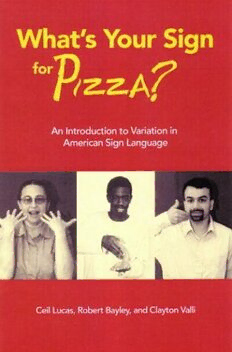Download What's Your Sign for Pizza?: An Introduction to Variation in American Sign Language PDF Free - Full Version
Download What's Your Sign for Pizza?: An Introduction to Variation in American Sign Language by Ceil Lucas, Robert Bayley, Clayton Valli in PDF format completely FREE. No registration required, no payment needed. Get instant access to this valuable resource on PDFdrive.to!
About What's Your Sign for Pizza?: An Introduction to Variation in American Sign Language
This introductory text celebrates another dimension of diversity in the United States Deaf community——variation in the way American Sign Language (ASL) is used by Deaf people all across the nation. The different ways people have of saying or signing the same thing defines variation in language. In spoken English, some people say ''soda,'' others say ''pop,'' ''coke,'' or ''soft drink;'' in ASL, there are many signs for BIRTHDAY, HALLOWEEN, EARLY, and of course, PIZZA. ''What's Your Sign for PIZZA'' derives from an extensive seven-year research project in which more than 200 Deaf ASL users representing different ages, genders and ethnic groups from seven different regions were videotaped sharing their signs for everyday vocabulary. This useful text and its accompanying CD begins with an explanation of the basic concepts of language and the structure of sign language, since sign variation abides by the rules governing all human languages. Each part of the text concludes with questions for discussion, and the final section offers three supplemental readings that provide further information on variation in both spoken and signed languages. ''What's Your Sign for PIZZA'' also briefly sketches the development of ASL, which explains the relationships between language varieties throughout the country.
Detailed Information
| Author: | Ceil Lucas, Robert Bayley, Clayton Valli |
|---|---|
| Publication Year: | 2003 |
| ISBN: | 9781563681448 |
| Pages: | 200 |
| Language: | |
| File Size: | 0.993 |
| Format: | |
| Price: | FREE |
Safe & Secure Download - No registration required
Why Choose PDFdrive for Your Free What's Your Sign for Pizza?: An Introduction to Variation in American Sign Language Download?
- 100% Free: No hidden fees or subscriptions required for one book every day.
- No Registration: Immediate access is available without creating accounts for one book every day.
- Safe and Secure: Clean downloads without malware or viruses
- Multiple Formats: PDF, MOBI, Mpub,... optimized for all devices
- Educational Resource: Supporting knowledge sharing and learning
Frequently Asked Questions
Is it really free to download What's Your Sign for Pizza?: An Introduction to Variation in American Sign Language PDF?
Yes, on https://PDFdrive.to you can download What's Your Sign for Pizza?: An Introduction to Variation in American Sign Language by Ceil Lucas, Robert Bayley, Clayton Valli completely free. We don't require any payment, subscription, or registration to access this PDF file. For 3 books every day.
How can I read What's Your Sign for Pizza?: An Introduction to Variation in American Sign Language on my mobile device?
After downloading What's Your Sign for Pizza?: An Introduction to Variation in American Sign Language PDF, you can open it with any PDF reader app on your phone or tablet. We recommend using Adobe Acrobat Reader, Apple Books, or Google Play Books for the best reading experience.
Is this the full version of What's Your Sign for Pizza?: An Introduction to Variation in American Sign Language?
Yes, this is the complete PDF version of What's Your Sign for Pizza?: An Introduction to Variation in American Sign Language by Ceil Lucas, Robert Bayley, Clayton Valli. You will be able to read the entire content as in the printed version without missing any pages.
Is it legal to download What's Your Sign for Pizza?: An Introduction to Variation in American Sign Language PDF for free?
https://PDFdrive.to provides links to free educational resources available online. We do not store any files on our servers. Please be aware of copyright laws in your country before downloading.
The materials shared are intended for research, educational, and personal use in accordance with fair use principles.

